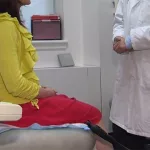
BURLINGTON, Vt. (WCAX) – Tens of thousands of low-income Vermonters are among those across the country who have lost access to Medicaid as a pandemic-era policy known as “continuous enrollment” came to an end earlier this year. That means many are paying more than they can afford for life-saving medicines and other treatments.
“I have no control over type one diabetes. It’s an autoimmune disorder, and it feels like I’m being punished with a bill just to live,” said Erin Kellar of Burlington. The 32-year-old is one of more than 25,000 Vermonters who lost access to Medicaid earlier this year.
Throughout the pandemic, federal rules required states to keep low-income Vermonters on Medicaid even if they don’t meet the criteria. But starting in April, the Department of Health Access began unwinding who is eligible for Medicaid and Dr. Dynasaur after the rules expired and extra funding ran out.
Kellar says swimming helps ease her stress but has done little to calm her in the face of health care costs. “I’ve noticed that I’m more insulin resistant, which means that my body is kind of not taking in the insulin as easily so it means that I need more insulin, which ultimately raises costs.”
Kellar was diagnosed with diabetes during the pandemic. She qualified for Medicaid as a full-time grad student working part-time. She has since graduated and works full-time. Vermonters between March 2020 and April of last year remained on Medicaid even if they no longer qualified. Kellar lost her access in July. “It’ll end up being about a quarter of yearly income to just pay for basic health care that I wasn’t paying for before,” she said.
“This protection is called continuous coverage. It was in place to ensure as many people as possible could keep their health insurance and access health care during the pandemic,” said Alex McCracken with the Vermont Agency of Human Services.
Kellar, who makes a little under $40,000 a year, worries if she’ll be able to afford maintenance drugs. “I’ve actually started to notice I second guess myself sometimes when I’m like, how much insulin do I need? How much do I have left? Will this last me until I can refill my scripts? And that’s dangerous,” she said.
McCracken points out a majority of cases in the re-determination process that may be no longer eligible for Medicaid meet Vermont’s requirements for health plans through Vermont Health Connect. “We encourage folks to look at their options on the Vermont Health Connect portal to look at the plan comparison tool and to see what financial assistance might be available,” she said.
But someone like Kellar does not meet the rules or income levels to qualify for the state plans. In addition to diabetes, she is a cancer survivor with other auto-immune disorders.
She says her whole life has changed to meet the demands of health care costs with her new private health insurance. “If we don’t have our health, we can’t get other needs met that actually are fulfilling. It’s the foundation of everything,” she said.
State officials say the 25,000 Vermonters make up about 60% of the total under Medicaid re-determination. As for qualified plans with Vermont Health Connect, open enrollment goes through January 15.
Meanwhile, Kellar says she and others will be attending a rally at the Statehouse Friday to call attention to their predicament.
Related Stories:
Thousands of Vermonters expected to lose Medicaid following program change
